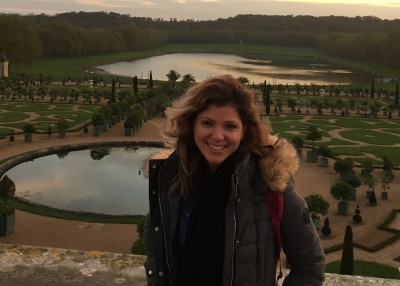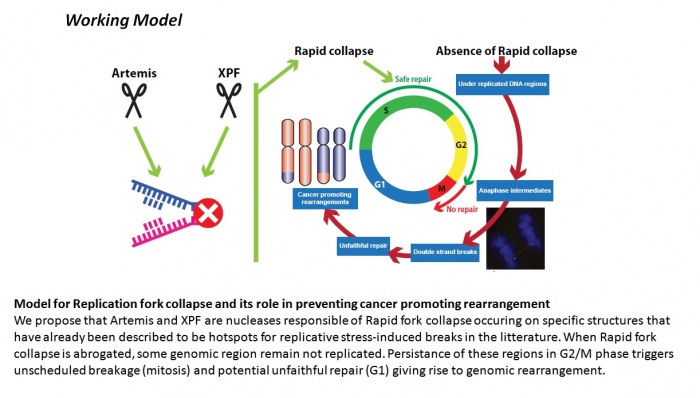Alessandra Pelegrini
From Laboratório de Reparo de DNA
| Revisão de 14:37, 23 Abril 2018 Root (Discussão | contribs) ← Ver a alteração anterior |
Revisão de 14:37, 23 Abril 2018 Root (Discussão | contribs) Ver a alteração posterior → |
||
| Linha 1: | Linha 1: | ||
| {| | {| | ||
| |- | |- | ||
| - | |[[Image:AlePelegrini_Profile.jpg|100px]] | + | |[[Image:AlePelegrini_Profile.jpg|400px]] |
| |BSc, <b>Biological Sciences</b>, <b>Universidade Federal do Rio Grande do Sul – UFRGS</b>,(2001/2005).<br>MSc, <b>Celular and Molecular Biology</b>, <b>Universidade Federal do Rio Grande do Sul – UFRGS</b>, (2006/2007).<br>PhD, <b>Celular and Molecular Biology</b>, <b>Universidade Federal do Rio Grande do Sul - UFRGS and Universidade de São Paulo – USP</b>, ( 2007/2012).<br>Post-doctoral Fellowship, <b> Cancer Research Center of Toulouse – CRCT</b> (2016/2018)<br>Post-doctoral Fellowship in DNA Repair Lab - <b>Institute of Biological Sciences at University of São Paulo - USP</b> (2013 – Current)<br><br>The researcher has experience in cell and molecular biology, culture of human and animal cells, proteomics and mass spectrometry, microscopy and immunofluorescence, drug testing and cytotoxicity<br><br> Research keywords: <b>Cancer</b>, <b>DNA repair</b>, <b>Replicative stress</b>, <b>Genetic instability</b> and <b>Chemotherapy and Therapeutic resistance</b><br> [http://buscatextual.cnpq.br/buscatextual/visualizacv.do?id=K4463877A9 Lattes]. | |BSc, <b>Biological Sciences</b>, <b>Universidade Federal do Rio Grande do Sul – UFRGS</b>,(2001/2005).<br>MSc, <b>Celular and Molecular Biology</b>, <b>Universidade Federal do Rio Grande do Sul – UFRGS</b>, (2006/2007).<br>PhD, <b>Celular and Molecular Biology</b>, <b>Universidade Federal do Rio Grande do Sul - UFRGS and Universidade de São Paulo – USP</b>, ( 2007/2012).<br>Post-doctoral Fellowship, <b> Cancer Research Center of Toulouse – CRCT</b> (2016/2018)<br>Post-doctoral Fellowship in DNA Repair Lab - <b>Institute of Biological Sciences at University of São Paulo - USP</b> (2013 – Current)<br><br>The researcher has experience in cell and molecular biology, culture of human and animal cells, proteomics and mass spectrometry, microscopy and immunofluorescence, drug testing and cytotoxicity<br><br> Research keywords: <b>Cancer</b>, <b>DNA repair</b>, <b>Replicative stress</b>, <b>Genetic instability</b> and <b>Chemotherapy and Therapeutic resistance</b><br> [http://buscatextual.cnpq.br/buscatextual/visualizacv.do?id=K4463877A9 Lattes]. | ||
| <b>Contato:</b> aleepelegrini[at]gmail.com | <b>Contato:</b> aleepelegrini[at]gmail.com | ||
Revisão de 14:37, 23 Abril 2018

| BSc, Biological Sciences, Universidade Federal do Rio Grande do Sul – UFRGS,(2001/2005). MSc, Celular and Molecular Biology, Universidade Federal do Rio Grande do Sul – UFRGS, (2006/2007). PhD, Celular and Molecular Biology, Universidade Federal do Rio Grande do Sul - UFRGS and Universidade de São Paulo – USP, ( 2007/2012). Post-doctoral Fellowship, Cancer Research Center of Toulouse – CRCT (2016/2018) Post-doctoral Fellowship in DNA Repair Lab - Institute of Biological Sciences at University of São Paulo - USP (2013 – Current) The researcher has experience in cell and molecular biology, culture of human and animal cells, proteomics and mass spectrometry, microscopy and immunofluorescence, drug testing and cytotoxicity Research keywords: Cancer, DNA repair, Replicative stress, Genetic instability and Chemotherapy and Therapeutic resistance Lattes. Contato: aleepelegrini[at]gmail.com |
|
Current ProjectCancer is currently the leading cause of morbidity and mortality worldwide which it is characterized by abnormal and uncontrolled cell growth in addition to genetic instability. It is very likely that genetic instability accelerates and even possibly initiates the proliferation of cancer cells by favoring the emergence of variant cells. Indeed, alterations of genes involved in genome maintenance promote carcinogenesis. This process is predominantly generated in S phase, during the DNA synthesis and relies on a replication stress activated by oncogenes. During the replication, the fork can be stalled for several reasons, such as DNA damage, structured DNA, nucleotide depletion and encounters with the transcription machinery, characterizing replication stress. In this way, replication stress contributes to chromosomal instability since stalled forks may eventually collapse, producing a broken DNA end. Up until recently, the mechanisms leading to fork collapse were only described after prolonged exposition of DNA replication stress sources (24 hours) by Mus81 activity. However, we have been described a phenomenon in which DNA replication forks stalls in response to DNA replication stress and are rapidly converted into DSBs, which we refer to as rapid replication fork breakage (RRFB) and it is dependent of XPF and Artemis nucleases. In this project, i have investigated the role of that endonuclease and its partner, ERCC1, in interstrand crosslink (ICLs) repair and its evolvement in chemotherapy sensitivity. Since the ICLs may cause persistent fork stalling, the proposed objective for this research is understanding how the XPF-ERCC1 complex and each of these separate protein participate in DNA replication stress, exploring their roles from the regulation of fork collapse to repair mechanisms, and evaluating the importance of these early events in the development of genetic instability from chromosomal aberrations.

Articles Published in Scientific JournalsMelo-Hanchuk TD, Slepick PF, Meirelles GV, Basei FL, Lovato DV, Granato DC, Pauletti BA, Domingues RR, Leme AFP, Pelegrini AL, Lenz G, Knapp S, Elkins JM and Kobarg J. NEK1 kinase domain structure and its dynamic protein interactome after exposure to Cisplatin. Scientific Reports 2017; 7: (5445) 1-13. |
|